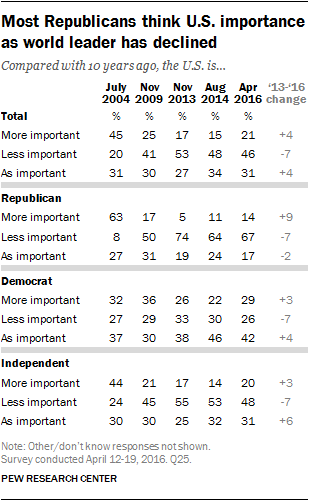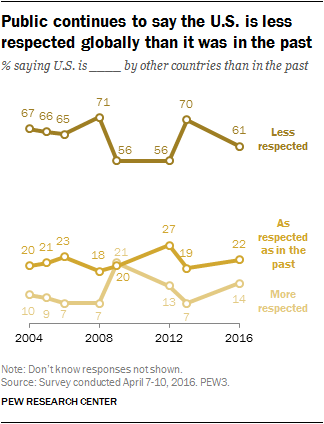The public continues to view the U.S. as less powerful globally – and less respected by other nations – than it was in the past. But Americans also say the United States is the world’s leading economic and military power.

Nearly half of Americans (46%) say the U.S. plays a less important and powerful role as a world leader than it did a decade ago. Just 21% say it plays a more important and powerful role, while 31% say it is as important as it was 10 years ago. These views have changed only modestly since 2013, when 53% said the U.S. was less powerful than it had been 10 years previously. But in 2004, just 20% said the U.S. was less powerful.
A majority of the public (61%) also says the U.S. is less respected by other countries, although this is lower than the share that said this in 2013 (70%).
Yet when asked which nation is the world’s leading economic power, 54% point to the U.S., with China a distant second at 34%. And even more (72%) view the U.S as the world’s leading military power.
Views of U.S. power and importance

Opinions about U.S. global power have long been divided along partisan lines. In 2004, during George W. Bush’s administration, 63% of Republicans said the U.S. was more important and powerful as a world leader than it had been 10 years earlier, while just 8% said it was less important (27% said the U.S. was about as powerful).
In 2009, Barack Obama’s first year in office, the balance of opinion among Republicans shifted. Half (50%) said the U.S. was a less powerful and important world leader, compared with just 17% who said it had become more important. Since then, the share of Republicans saying the U.S. is less powerful has increased, reaching 74% in 2013, before slipping to 64% a year later. Currently, 67% say the U.S. is less powerful and important than it was 10 years ago.
Democrats’ views of U.S. global power and importance have shown far less change over the course of the past two administrations. Currently, 29% say the U.S. is more important and powerful than it was a decade ago, 26% say it is less important and 42% say it is about the same. Democratic opinions were similar in 2004 (32% more important, 27% less, 37% about the same).
Independents’ views tend to be similar to the public’s overall. In the current survey, 48% say the U.S. is less important than it was 10 years ago, 20% say it is more important and 31% say it is about the same.
There also are age differences in opinions about U.S. global power. Currently, 52% of those ages 50 and older think the U.S. now plays a less important role, as do 45% of those ages 30 to 49. Just 33% of those younger than 30 say the U.S. plays a less important role than it did in the past.
Views of global respect for the U.S.

As has been the case since the Bush administration, most Americans (61%) say the United States is less respected by other countries than it was in the past. Just 14% say it is more respected, while 22% say it is about as respected. Nonetheless, the share who says the U.S. is less respected has declined from 70% in 2013.
Among those who say the United States is less respected internationally than in the past, most say it is a major problem: 38% of the public overall view this as a major problem. Fewer say that the U.S. is less respected but regard this as a minor problem (18% of the public) or not a problem at all (4% of the public).

Although majorities of all partisan groups currently say the U.S. is less respected globally than it was in the past, Republicans (71%) are more likely than Democrats (59%) and independents (58%) to say this. Both Republicans’ and independents’ views have become less downbeat about America’s image since 2013.
In 2008, during the Bush administration, majorities of all partisan groups also said the U.S. was less respected internationally than it had been in the past. At that time, however, a larger share of Democrats (81%) than independents (72%) and Republicans (60%) said this.
Leading economic and military superpower

Almost three-quarters of Americans (72%) say the U.S. is the predominant military force in the world, and 54% say it is the leading economic power. About one-third (34%) say China is the world’s leading economic power, while 6% name Japan and 2% say it is the countries of the European Union. Meanwhile, 12% say China is the world’s leading military power, 10% say it is Russia and 2% say the EU.
In annual surveys dating back to 2008, this is the first time that more than half of Americans have said the U.S. is the world’s leading economic power. This share is up eight percentage points since June of 2015 (from 46% then to 54% now).
The share saying the U.S. is the world’s military leader also increased eight percentage points, from 64% in November 2013 to 72% today. Over that time span, the share calling China the world’s military power fell from 19% to 12%, while the proportion saying Russia was the world’s military leader doubled from 5% to 10%.
Clear majorities of Democrats (73%), Republicans (66%) and independents (76%) say the U.S. is the world’s leading military power. And there are no partisan differences in the shares who say the U.S. is the world’s leading economic power (56% of Republicans, 55% of Democrats and 50% of independents say this).




